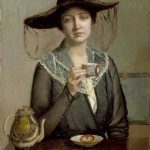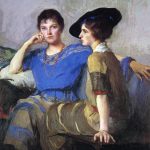Suzanne Valadon, born Marie-Clémentine Valadon on September 23, 1865, in Bessines-sur-Gartempe, France, was a pioneering artist whose work challenged the conventions of her time. Her journey from a circus performer and model to a celebrated painter is a testament to her extraordinary talent, determination, and resilience in the face of societal constraints.
Valadon’s early life was marked by poverty and hardship. Her family moved to Paris when she was a child, where she began working at a young age to help support them. Her foray into the arts began in the circus as an acrobat, but a severe fall ended this career when she was just 16. She then found work as an artist’s model, posing for some of the most prominent artists of the day, including Pierre-Auguste Renoir and Henri de Toulouse-Lautrec. It was during this period that she began to closely observe and learn the techniques of painting and drawing, laying the foundation for her future career.
Despite having no formal art education, Valadon began to paint and draw in earnest by the early 1890s. Her work quickly garnered attention for its bold lines, vibrant colors, and the emotional depth of its subjects. Valadon’s paintings often depicted the female form, not as an idealized object of male desire, but with honesty and empathy, highlighting the complexity and strength of women. Her portrayals of motherhood, in particular, broke new ground, combining tenderness with a stark realism that was rarely seen in the art of her time.
Valadon’s talent was recognized by fellow artists, including Edgar Degas, who became her mentor and friend. Degas was instrumental in helping Valadon navigate the male-dominated art world, introducing her to other artists and collectors. Under his guidance, she honed her skills and developed her distinctive style. Despite this support, Valadon faced significant obstacles as a woman artist. She struggled to gain acceptance in the official art circles of Paris and to support herself through her art.
In 1896, Valadon made history by becoming the first woman painter admitted to the Société Nationale des Beaux-Arts, a significant achievement that marked her acceptance into the French artistic elite. Her work continued to evolve, and she experimented with different subjects and styles, including landscapes, still lifes, and portraits. However, it was her unflinching depictions of female nudity and her exploration of female sexuality that remained some of her most powerful and controversial work.
Valadon’s personal life was as unconventional as her art. She had relationships with several artists and gave birth to her son, Maurice Utrillo, at a young age. Utrillo would go on to become a renowned painter in his own right. Valadon’s role as a single mother and her relationship with her son were central themes in her life and work. She was also known for her relationships with other artists, including André Utter, whom she married in 1914.
Throughout her career, Valadon remained committed to portraying the realities of women’s lives, challenging traditional representations of femininity and beauty. Her work gained increasing recognition and respect towards the end of her life, and she continued to paint until her death on April 7, 1938, in Paris.
Valadon’s legacy is that of a trailblazer who paved the way for future generations of women artists. Her fearless exploration of female identity and her commitment to depicting the truth of women’s experiences resonate to this day. Her paintings, characterized by their emotional intensity and technical skill, continue to be celebrated for their contribution to the development of modern art.
Valadon’s story is one of perseverance in the face of adversity, of breaking through barriers to express one’s true self. Her life and work serve as a powerful reminder of the importance of authenticity, courage, and the relentless pursuit of one’s passion. Today, Suzanne Valadon is remembered not only for her groundbreaking art but also for her role as a pioneer for women in the arts, an inspiration to all who seek to defy conventions and make their voices heard.






